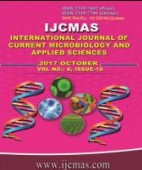


 National Academy of Agricultural Sciences (NAAS)
National Academy of Agricultural Sciences (NAAS)

|
PRINT ISSN : 2319-7692
Online ISSN : 2319-7706 Issues : 12 per year Publisher : Excellent Publishers Email : editorijcmas@gmail.com / submit@ijcmas.com Editor-in-chief: Dr.M.Prakash Index Copernicus ICV 2018: 95.39 NAAS RATING 2020: 5.38 |
In the present scenario, North Eastern States, sleeping giants are the store house of indigenous knowledge base which may be utilized for second green revolution towards sustainable development of the rural areas without hampering the ecological pursuits of the region. The enriched biodiversity and other indigenous knowledge base are still unexplored and not known to others. The horticulture enterprise is one of the important vocations of the north eastern hill region people and their management practices are ancient, indigenous and traditional in nature. Consequently, the need of the hour is to explore the indigenous knowledge base associated with the horticultural enterprise in the north eastern region for assessing the scientific rational of the same and creating a new blend of technology mix for sustainable development of the horticultural enterprise. Keeping the above consideration in view, the present study is conducted to harness the indigenous knowledge base associated with the horticultural enterprise in Manipur state. The participatory methodology was followed to construct and conduct the whole research study. The key informant methods and focus group discussion methods were followed to collect the information. The collected information reflected that certain plants are used traditionally in combination with other plants for extraction and preparation of dyes utilizing indigenous processes. The people also have a tradition of conserving wild orchids in nature based on various religious beliefs and herbal healthcare. It is an important factor for sustainability of natural genetic resource management. Certain plants are used by the ethnic people of Manipur to forecast weather, to predict natural calamities and as taboos to avoid negative occurrences. These traditional knowledge systems are taken care and also preserve these plants as an important resource. Thus ample number of indigenous knowledge is available in this region which would be refocused in near future.
 |
 |
 |
 |
 |